Jose Pablo Folch
SoDaDE: Solvent Data-Driven Embeddings with Small Transformer Models
Sep 26, 2025Abstract:Computational representations have become crucial in unlocking the recent growth of machine learning algorithms for chemistry. Initially hand-designed, machine learning has shown that meaningful representations can be learnt from data. Chemical datasets are limited and so the representations learnt from data are generic, being trained on broad datasets which contain shallow information on many different molecule types. For example, generic fingerprints lack physical context specific to solvents. However, the use of harmful solvents is a leading climate-related issue in the chemical industry, and there is a surge of interest in green solvent replacement. To empower this research, we propose a new solvent representation scheme by developing Solvent Data Driven Embeddings (SoDaDE). SoDaDE uses a small transformer model and solvent property dataset to create a fingerprint for solvents. To showcase their effectiveness, we use SoDaDE to predict yields on a recently published dataset, outperforming previous representations. We demonstrate through this paper that data-driven fingerprints can be made with small datasets and set-up a workflow that can be explored for other applications.
The Catechol Benchmark: Time-series Solvent Selection Data for Few-shot Machine Learning
Jun 09, 2025Abstract:Machine learning has promised to change the landscape of laboratory chemistry, with impressive results in molecular property prediction and reaction retro-synthesis. However, chemical datasets are often inaccessible to the machine learning community as they tend to require cleaning, thorough understanding of the chemistry, or are simply not available. In this paper, we introduce a novel dataset for yield prediction, providing the first-ever transient flow dataset for machine learning benchmarking, covering over 1200 process conditions. While previous datasets focus on discrete parameters, our experimental set-up allow us to sample a large number of continuous process conditions, generating new challenges for machine learning models. We focus on solvent selection, a task that is particularly difficult to model theoretically and therefore ripe for machine learning applications. We showcase benchmarking for regression algorithms, transfer-learning approaches, feature engineering, and active learning, with important applications towards solvent replacement and sustainable manufacturing.
BARK: A Fully Bayesian Tree Kernel for Black-box Optimization
Mar 07, 2025

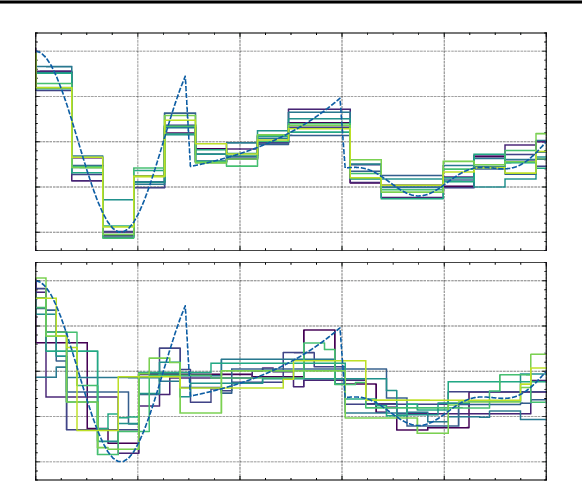
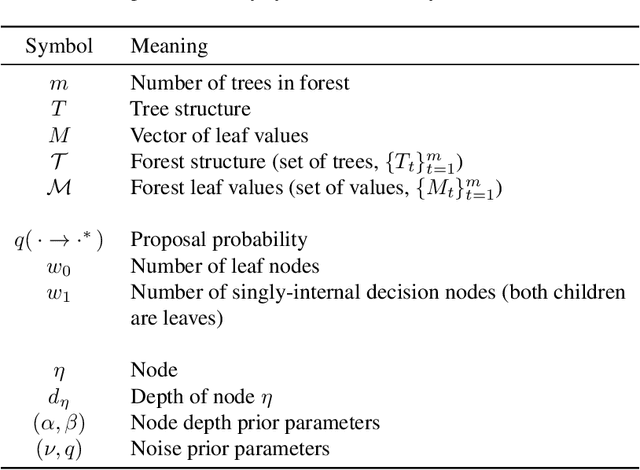
Abstract:We perform Bayesian optimization using a Gaussian process perspective on Bayesian Additive Regression Trees (BART). Our BART Kernel (BARK) uses tree agreement to define a posterior over piecewise-constant functions, and we explore the space of tree kernels using a Markov chain Monte Carlo approach. Where BART only samples functions, the resulting BARK model obtains samples of Gaussian processes defining distributions over functions, which allow us to build acquisition functions for Bayesian optimization. Our tree-based approach enables global optimization over the surrogate, even for mixed-feature spaces. Moreover, where many previous tree-based kernels provide uncertainty quantification over function values, our sampling scheme captures uncertainty over the tree structure itself. Our experiments show the strong performance of BARK on both synthetic and applied benchmarks, due to the combination of our fully Bayesian surrogate and the optimization procedure.
Transition Constrained Bayesian Optimization via Markov Decision Processes
Feb 13, 2024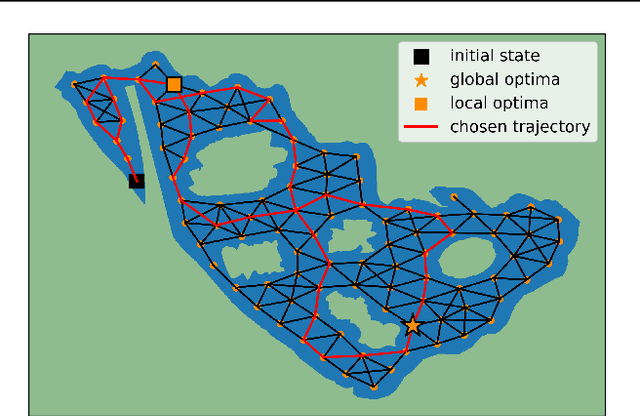
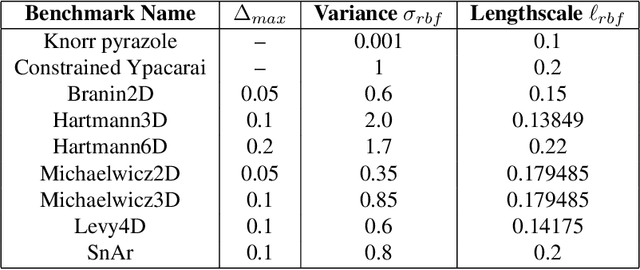

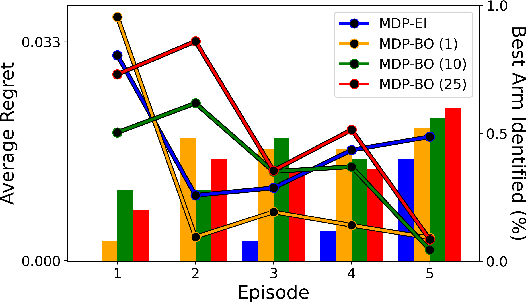
Abstract:Bayesian optimization is a methodology to optimize black-box functions. Traditionally, it focuses on the setting where you can arbitrarily query the search space. However, many real-life problems do not offer this flexibility; in particular, the search space of the next query may depend on previous ones. Example challenges arise in the physical sciences in the form of local movement constraints, required monotonicity in certain variables, and transitions influencing the accuracy of measurements. Altogether, such transition constraints necessitate a form of planning. This work extends Bayesian optimization via the framework of Markov Decision Processes, iteratively solving a tractable linearization of our objective using reinforcement learning to obtain a policy that plans ahead over long horizons. The resulting policy is potentially history-dependent and non-Markovian. We showcase applications in chemical reactor optimization, informative path planning, machine calibration, and other synthetic examples.
Practical Path-based Bayesian Optimization
Dec 01, 2023
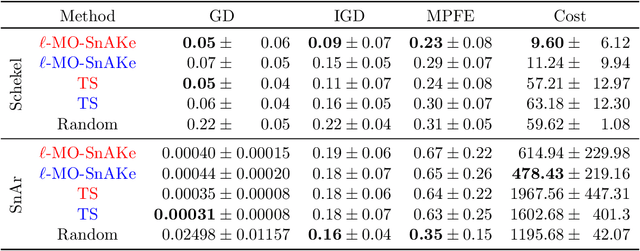
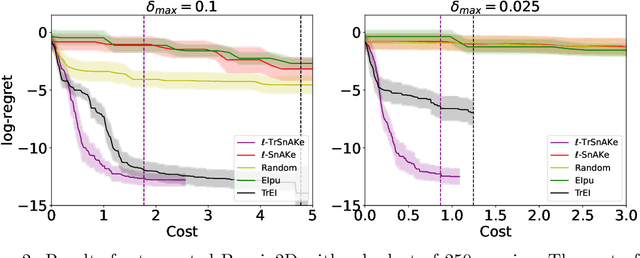
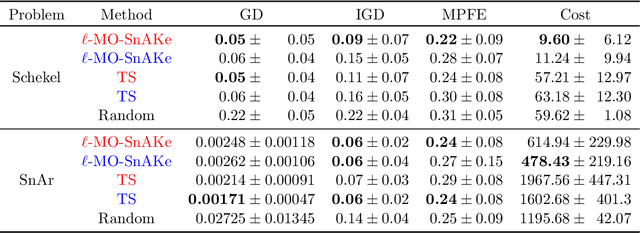
Abstract:There has been a surge in interest in data-driven experimental design with applications to chemical engineering and drug manufacturing. Bayesian optimization (BO) has proven to be adaptable to such cases, since we can model the reactions of interest as expensive black-box functions. Sometimes, the cost of this black-box functions can be separated into two parts: (a) the cost of the experiment itself, and (b) the cost of changing the input parameters. In this short paper, we extend the SnAKe algorithm to deal with both types of costs simultaneously. We further propose extensions to the case of a maximum allowable input change, as well as to the multi-objective setting.
* 6 main pages, 12 with references and appendix. 4 figures, 2 tables. To appear in NeurIPS 2023 Workshop on Adaptive Experimental Design and Active Learning in the Real World
Gaussian Processes for Monitoring Air-Quality in Kampala
Nov 28, 2023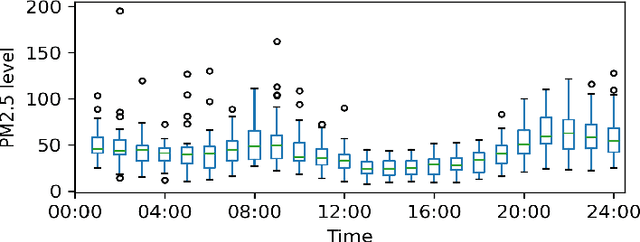
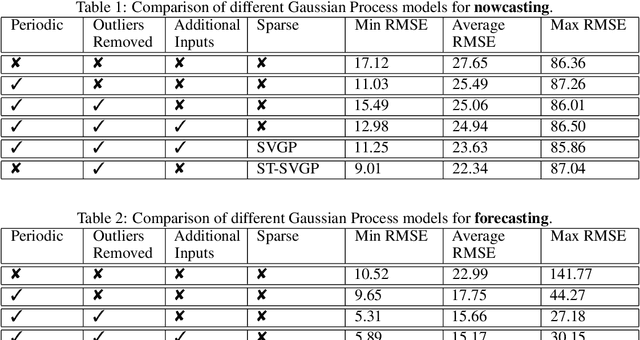
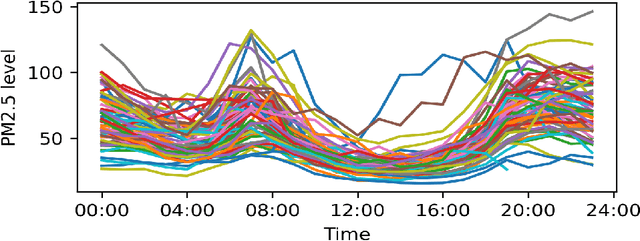
Abstract:Monitoring air pollution is of vital importance to the overall health of the population. Unfortunately, devices that can measure air quality can be expensive, and many cities in low and middle-income countries have to rely on a sparse allocation of them. In this paper, we investigate the use of Gaussian Processes for both nowcasting the current air-pollution in places where there are no sensors and forecasting the air-pollution in the future at the sensor locations. In particular, we focus on the city of Kampala in Uganda, using data from AirQo's network of sensors. We demonstrate the advantage of removing outliers, compare different kernel functions and additional inputs. We also compare two sparse approximations to allow for the large amounts of temporal data in the dataset.
Combining Multi-Fidelity Modelling and Asynchronous Batch Bayesian Optimization
Nov 11, 2022Abstract:Bayesian Optimization is a useful tool for experiment design. Unfortunately, the classical, sequential setting of Bayesian Optimization does not translate well into laboratory experiments, for instance battery design, where measurements may come from different sources and their evaluations may require significant waiting times. Multi-fidelity Bayesian Optimization addresses the setting with measurements from different sources. Asynchronous batch Bayesian Optimization provides a framework to select new experiments before the results of the prior experiments are revealed. This paper proposes an algorithm combining multi-fidelity and asynchronous batch methods. We empirically study the algorithm behavior, and show it can outperform single-fidelity batch methods and multi-fidelity sequential methods. As an application, we consider designing electrode materials for optimal performance in pouch cells using experiments with coin cells to approximate battery performance.
SnAKe: Bayesian Optimization with Pathwise Exploration
Feb 16, 2022



Abstract:Bayesian Optimization is a very effective tool for optimizing expensive black-box functions. Inspired by applications developing and characterizing reaction chemistry using droplet microfluidic reactors, we consider a novel setting where the expense of evaluating the function can increase significantly when making large input changes between iterations. We further assume we are working asynchronously, meaning we have to decide on new queries before we finish evaluating previous experiments. This paper investigates the problem and introduces 'Sequential Bayesian Optimization via Adaptive Connecting Samples' (SnAKe), which provides a solution by considering future queries and preemptively building optimization paths that minimize input costs. We investigate some convergence properties and empirically show that the algorithm is able to achieve regret similar to classical Bayesian Optimization algorithms in both the synchronous and asynchronous settings, while reducing the input costs significantly.
 Add to Chrome
Add to Chrome Add to Firefox
Add to Firefox Add to Edge
Add to Edge